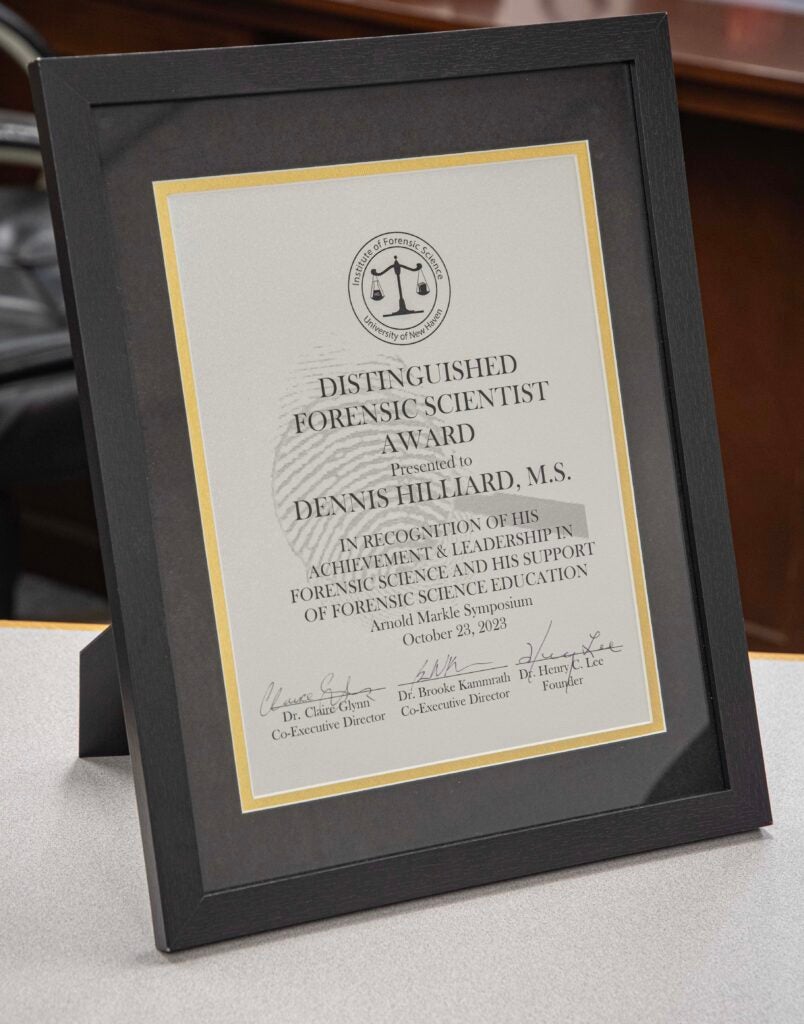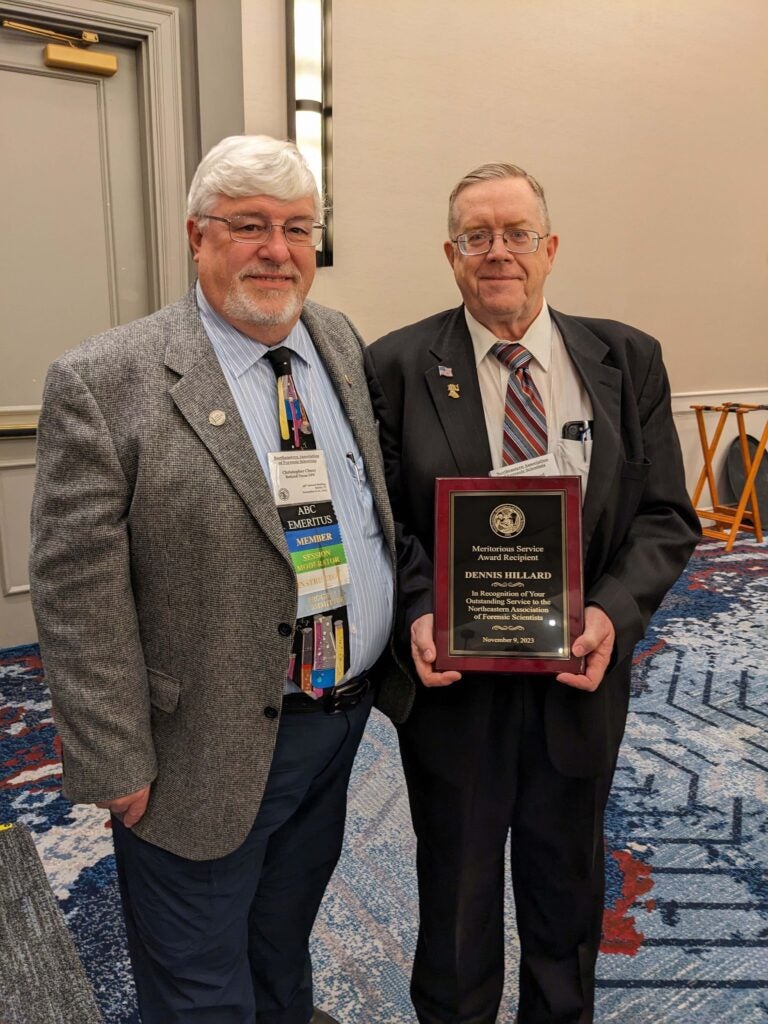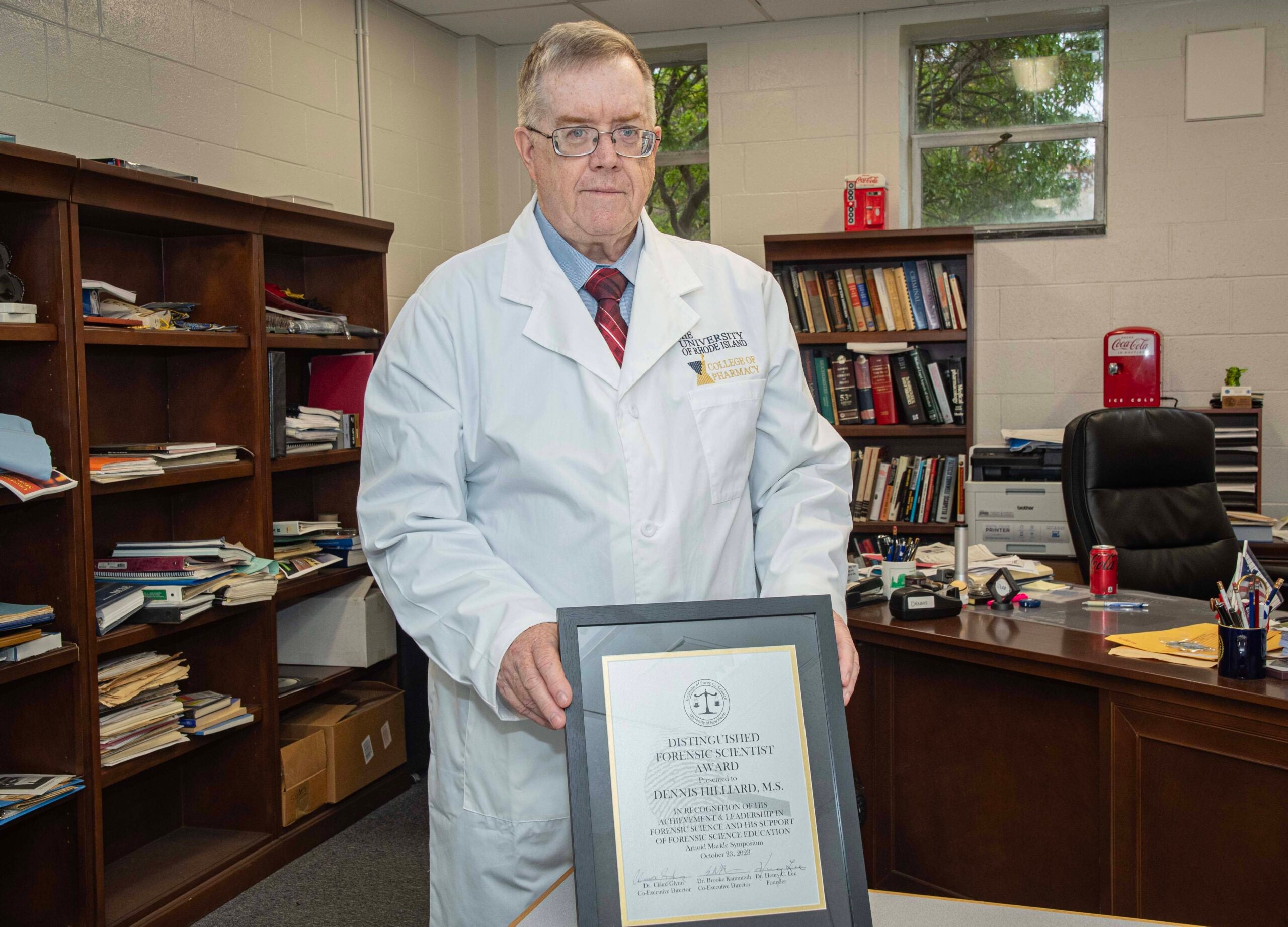KINGSTON, R.I. – Dec. 4, 2023 – Dennis Hilliard’s career has taken him to some interesting places, beyond the laboratory bench. Over the years, Hilliard, director of the Rhode Island State Crime Laboratory at the University of Rhode Island, has tackled unique cases, from handling a coffee can packed with fire debris from a suspected arson case in Providence to analyzing greyhound urine samples from the former Lincoln Park Dog Track to check for doping.
Though his work exposes him to the seamier side of life in southern New England, Hilliard’s commitment to the integrity of science brought him this fall to the Henry C. Lee Institute of Forensic Science in Connecticut to receive the Distinguished Forensic Scientist Award. The award was presented to Hilliard by Lee, one of the world’s leading forensic scientists, during the institute’s annual Markle Symposium.
Two weeks later, Hilliard was honored with the Northeastern Association of Forensic Scientists Meritorious Service Award, presented at the group’s 49th annual meeting.
Unlikely crime fighter
Hilliard, an adjunct professor of pharmacy, has worked in forensics since 1977, first training police officers in the use of the Breathalyzer to determine the blood alcohol concentration in drunk drivers.

When he first came to URI in 1976 for his master’s degree in pharmacology and toxicology, he initially had plans to prepare for medical school. But he became fascinated by the work of the state crime laboratory in the College of Pharmacy and ended up making it his career. Hilliard’s major professor, David R. DeFanti, was the director of the crime lab at that time.
Hilliard first focused on arson chemistry, joining the staff at the University in 1980 as a chemist, under a federal grant. When the grant ended, he accepted a job as forensic scientist in 1983 at the Rhode Island Department of Health laboratory. In 1984, he returned to the state crime laboratory as a criminalist. He was appointed director of the crime lab in 1995.
Sharing about the lab’s work is one of Hilliard’s favorite things in his job. He especially enjoys talking to students thinking about what to do after high school or college, talking about careers and needs in the world of forensic science.
Hilliard recently met with ninth-grade biomedical students at Central Falls High School and said the students there had good answers and also good questions for him. “Our students enjoyed learning about the work done at the crime lab at URI,” says teacher Charlie Fisher. “Dennis shared his knowledge and expertise with the students, and provided guidance for those interested in pursuing a career in forensic science. Students were inspired by his presentation and many stated that they want to work in forensics after they graduate high school!”
A fan of fictional sleuth Sherlock Holmes, Hilliard likes to ask students what Holmes’ greatest tool as a detective is. Students often guess his magnifying glass, but Hilliard tells them no—it’s his brain. “The most valuable tool, I tell students, is your mind—you use it to observe, deduce, reason, interpret. The brain is our biggest tool as students, scientists, or detectives; it gives us the capacity to think, deduct, to imagine.”
After 40 years working around crime, one might think Hilliard would be jaded. But he says he enjoys meeting the high standards of his team and making a difference in the community.

Hilliard says his team needs to be beyond reproach, approaching its work with integrity and without bias. Crime lab experts are called to testify approximately four to five times a year; Hilliard himself has testified more than 100 times in state and federal courts in Rhode Island and provided deposition testimony in several civil cases as an expert witness.
“We need to be transparent and can’t be personally involved with cases,” he says. “We need to be 20,000 feet above them, unbiased, and just let the chips fall where they may. We just need to report the scientific facts.”
“We put a value on getting the answers right and analyzing what’s in front of us,” Hilliard says. “Of course, you want to see the right people put away and prevent the wrong people from being sent away, but it’s important to not be swayed in any way, by the crimes committed.”
As director, Hilliard has capitalized on the University’s broad range of scientists—including those from engineering, chemistry, computer science and textiles—to supplement work done by his crime lab team. A co-founder of the Forensic Science Partnership, one of the oldest and still active interdisciplinary programs at the University, he also was a key figure in establishing the Forensic Science Seminar Series. The series has brought forensic and other experts from around the world to speak at the Kingston Campus for 25 years.
Hilliard also enjoys instructing police officers in forensic science techniques. He coordinates the training of 36 officers annually, all nominated and sent by their departments. The University’s Feinstein College of Education course ‘Criminal Investigation: Scientific Evidence I & II’ provides basic training in the documentation and processing of crime scenes, evidence collection procedures, and latent print development and comparison. The hands-on class gives police officers a better understanding of the science involved and the best ways to gather evidence that will stand up in court.
Sean Corrigan, chief of the Narragansett Police Department, is a graduate of the course and readily speaks to its value. Corrigan attended the criminal investigation course at URI in 1999 as a member of the department’s detective division and says the course prepared him well for investigative work. “Director Hilliard was an excellent instructor and his passion for his work has not diminished in the years since,” Corrigan says. “I send officers to the school every year. The training they receive is invaluable. The course provides officers with the education to be an asset at a crime scene rather than a liability. I have seen this training pay off many times with our investigators and patrol officers alike. I have been in law enforcement for 27 years now and consider the school at URI to be among the best training I’ve received.”
Kingston beat
As a counterbalance to the sometimes grim nature of his daily work, Hilliard says he enjoys working at URI.
“I like going to work here. Being around young people is nice. Walking around makes you feel younger, or older sometimes,” he says with a laugh. “I’m still enjoying being here at the University.”
Hilliard says there is an enduring public fascination with crime, evidenced by the public’s media habits and consumption of crime novels, podcasts, and long-running shows like CSI and Law and Order.
And Hilliard even plays a role in a series, as well.
Local author Claremary Sweeney ’71 wrote Hilliard into her popular South County Mystery Series.
“Professor Hill” first appears in Sweeney’s second book in the series, set on the URI campus, and is a recurring character in five books to date, with another in the works.
“I had been attending the forensic lecture series for a number of years,” Sweeney says, “and found it very interesting.” She wanted to get the facts right and reached out to Hilliard for specific details on forensic analysis.
“He just opened his door to me,” she recalls. “We are very fortunate here in Rhode Island to have the great resources we do, not only in the state crime lab but also in Dennis. Dennis works really hard for the University and for the entire state to ensure there is top-notch science and forensic services for all of Rhode Island.”
Hilliard is happy to share insight on Rhode Island crime, and forensic science techniques, beyond the University, lecturing at schools and in towns across the state and giving tours for visitors to the crime lab, by appointment. To inquire, or to be added to the email list for URI’s public Forensic Science Seminar Series, email dhilliard@uri.edu or call 401-874-5056.

